Understanding Criminal Background Check Massachusetts: A Complete Guide
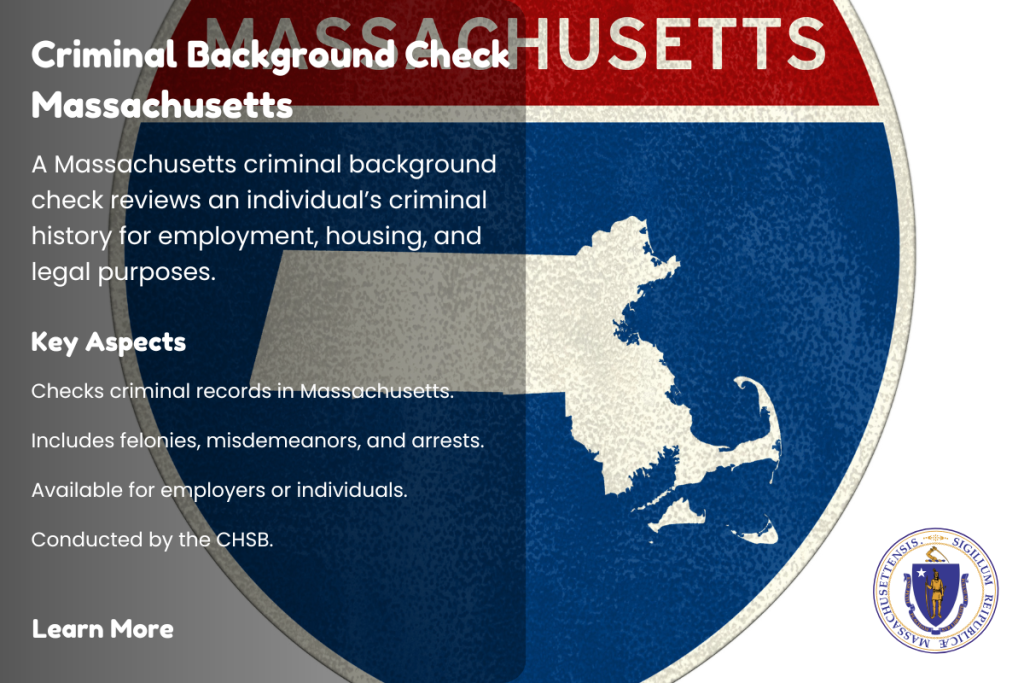
Introduction to Criminal Background Checks in Massachusetts
A criminal background check in Massachusetts refers to a process through which an individual’s criminal history is reviewed, typically to assess their eligibility for employment, housing, or other public services. This check is a fundamental tool used by employers, landlords, and various organizations to make informed decisions and ensure that those they work with have a clean legal history.
In Massachusetts, the process is primarily governed by the Criminal Offender Record Information (CORI) system, which provides access to information about an individual’s criminal history, including arrests, charges, convictions, and any other legal actions related to criminal behavior. Criminal background checks in Massachusetts can include state, federal, and local records, depending on the specific type of check required.
There are different types of criminal background checks that may be conducted in Massachusetts:
- State-level criminal background checks: These checks review a person’s criminal history within Massachusetts, pulling records from the state’s CORI database.
- Federal criminal background checks: These checks provide a broader scope, accessing records maintained by federal agencies such as the FBI.
- Local background checks: These checks focus on records from specific towns or cities in Massachusetts and are typically used by local law enforcement or employers who require very specific geographic records.
These checks are conducted to verify an individual’s identity, ensure that they have no prior criminal convictions that could pose risks, and confirm that they meet legal or ethical standards for employment or housing.
Why Are Criminal Background Checks Important in Massachusetts?
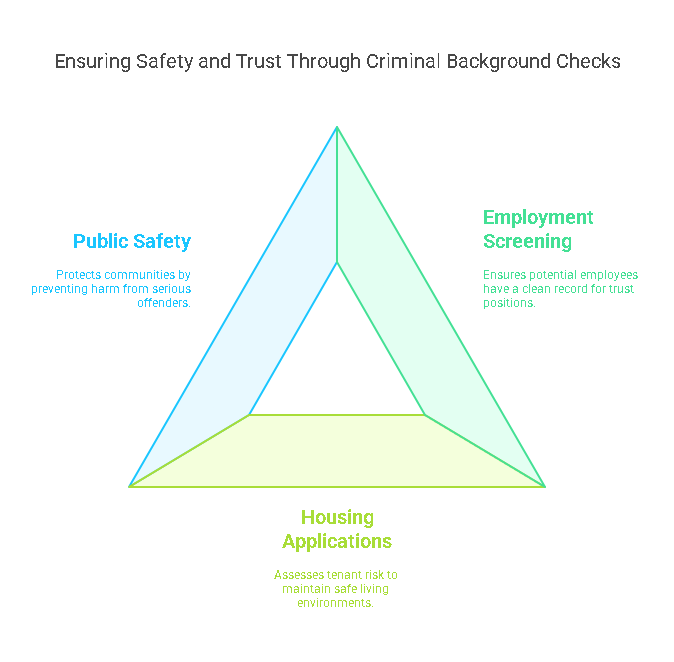
Criminal background checks play a crucial role in Massachusetts for several reasons. For employers, landlords, and other institutions, conducting background checks is vital for assessing risk, ensuring safety, and maintaining legal compliance. Here’s why criminal background checks are so important:
- Employment Screening: Employers use criminal background checks to ensure that potential employees have a clean record, particularly for jobs that involve access to sensitive information or positions of trust, such as healthcare, finance, or government positions. A criminal history could indicate a risk of theft, violence, or dishonesty, which can lead to hiring decisions that protect both the company and its employees.
- Housing Applications: Landlords rely on criminal background checks to determine if an applicant poses a risk to other tenants or the property. People with a history of violent crime, property damage, or drug offenses may not be considered suitable tenants for certain rental properties.
- Public Safety and Legal Compliance: The public has an inherent interest in maintaining safety in their communities. Criminal background checks help ensure that individuals convicted of serious offenses do not hold positions that could potentially harm others, especially in regulated industries. Additionally, these checks are required by law in specific industries and professions.
Criminal background checks are not only a precautionary measure for individuals and organizations but also serve to establish trust between employers and employees or landlords and tenants. By screening out those with histories of criminal conduct, background checks aim to create safer environments for everyone.
What Information Does a Criminal Background Check Reveal?
A criminal background check in Massachusetts provides essential information that can affect various aspects of a person’s life, such as employment and housing opportunities. Typically, the report will include:
- Criminal Convictions: This includes any felonies or misdemeanors the individual has been convicted of, along with the sentencing details.
- Arrest Records: These records indicate any arrests made, even if they did not result in a conviction.
- Warrants: If there is an outstanding warrant for an individual’s arrest, it will show up in the background check.
- Court Judgments: The report will also reflect any judgments or cases involving the individual, which might include probation, parole, or court orders.
In Massachusetts, the CORI system tracks this information and can be accessed by certain authorized organizations, such as employers, housing providers, and government agencies. It is important to note that only certain criminal records are available to the public, while others, such as sealed or expunged records, may not be included in a standard background check.
How Criminal Background Checks Are Conducted in Massachusetts
The process of conducting a criminal background check in Massachusetts involves several steps. The primary source of information for a criminal background check in the state is the CORI system, which is maintained by the Massachusetts State Police. Here’s how the process typically unfolds:
- Requesting a Criminal Background Check: Individuals or organizations that require a background check must first submit a request. Requests can be made through the Massachusetts Criminal History Systems Board (CHSB) or via the CORI system, depending on whether the request is made by an individual or a third party, such as an employer or landlord.
- Consent from the Individual: When requesting a background check for employment, housing, or other purposes, the individual being screened must provide written consent. This ensures that the person understands the process and grants permission for their records to be reviewed.
- Review of Criminal Records: The requested information is then pulled from the CORI database, which includes records from across the state. In some cases, additional records may be pulled from federal or local databases depending on the scope of the check.
- Access and Reporting: Once the data is gathered, it is compiled into a report that is sent to the requesting party. The report will contain any relevant criminal history information, including arrests, convictions, and any pending charges.
- Verification and Accuracy: The individual’s records are reviewed for accuracy. Any discrepancies or mistakes can be addressed through a correction or dispute process, which is essential to ensure that no false information is used in decision-making.
Common Mistakes or Issues with Criminal Background Checks in Massachusetts
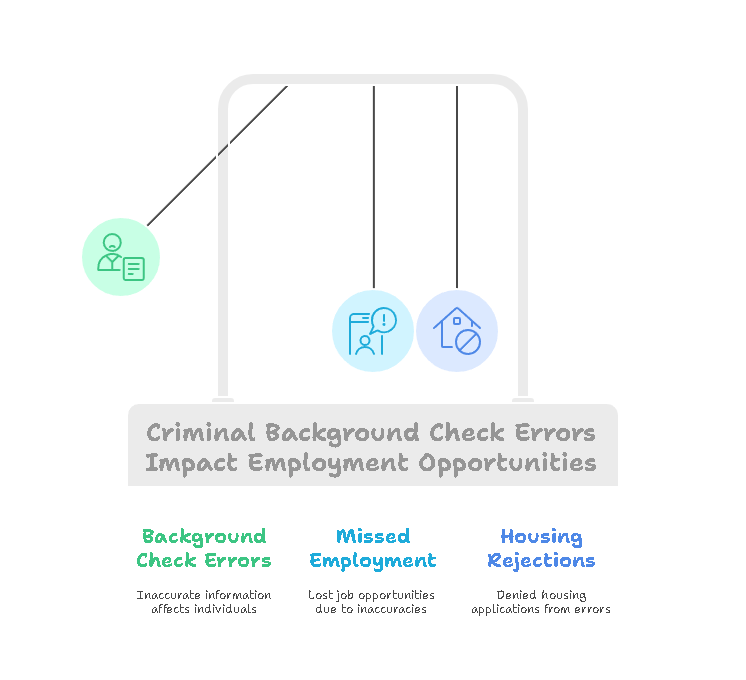
Errors in criminal background checks can cause significant problems for individuals, including missed employment opportunities or housing rejections. Some common issues with criminal background checks in Massachusetts include:
- Mistaken Identity: Sometimes, individuals with similar names or birthdates may have their records mixed up with someone else’s, leading to inaccurate information on their background checks.
- Outdated Records: In some cases, records may not be updated or removed as required by law. This could include old charges that were dismissed, or sealed records that should not be included in the report.
- Misidentified Information: Errors in spelling, dates of birth, or other personal information can lead to incorrect background checks being conducted.
- Missing Information: Sometimes, the CORI system may fail to include all relevant criminal history details, which could leave an incomplete picture of an individual’s record.
Ensuring the accuracy of background checks is critical for both individuals and organizations. Any discrepancies should be addressed as soon as possible to prevent any negative consequences.
The Process of Getting and Correcting Criminal Background Checks in Massachusetts
In Massachusetts, obtaining a criminal background check is a straightforward process, but it does require attention to detail to ensure that the information provided is accurate. There are several methods by which individuals and organizations can request a criminal background check, and the process varies depending on the type of request (for personal use, employment purposes, or housing applications). The Massachusetts Criminal History Systems Board (CHSB) maintains the Criminal Offender Record Information (CORI) system, which houses the data for all criminal background checks in the state.
Here’s a step-by-step guide on how to obtain a criminal background check in Massachusetts:
- Determine Eligibility: Before requesting a criminal background check, it is important to understand who is eligible to access these records. In Massachusetts, criminal background checks can be requested by:
- Individuals: If you need to check your own criminal history for personal reasons or to review your CORI report.
- Employers: Employers conducting background checks for hiring purposes, especially for positions that involve working with vulnerable populations or sensitive data.
- Landlords: Property owners who are conducting background checks on potential tenants.
- Government Agencies: Agencies requiring criminal history information for various regulatory or public safety functions.
- Request a CORI Report: To obtain a criminal background check, individuals and organizations need to request a CORI report through the Massachusetts Criminal History Systems Board (CHSB). There are two primary methods to request a CORI report:
- Online via the CHSB website: You can request your own criminal history report through the Massachusetts government website by providing necessary information such as your full name, date of birth, and social security number. Employers and other authorized entities can also request reports online for specific individuals, with the appropriate consent.
- Mail-in Requests: If you prefer, you can submit a paper request for a criminal background check. This method requires a completed CORI request form along with any necessary identification and a fee payment.
- Provide Consent: For employment or housing-related checks, the individual being screened must provide written consent before their background check can be processed. This consent is required to ensure that the person is aware that their criminal history will be reviewed.
- Review the Information: After submitting the request, the Massachusetts State Police or the CHSB will process the report and provide the requested information. The criminal background check will typically include details such as criminal convictions, pending charges, and any relevant arrest or court records.
- Receiving the Report: Once the background check is completed, the individual or organization will receive a copy of the criminal background check report. The report will outline any convictions, arrests, warrants, and other relevant criminal history information based on what is available in the CORI system. It is essential to verify the accuracy of the information contained in the report to avoid errors that could affect hiring or housing decisions.
How to Correct Errors in a Massachusetts Criminal Background Check
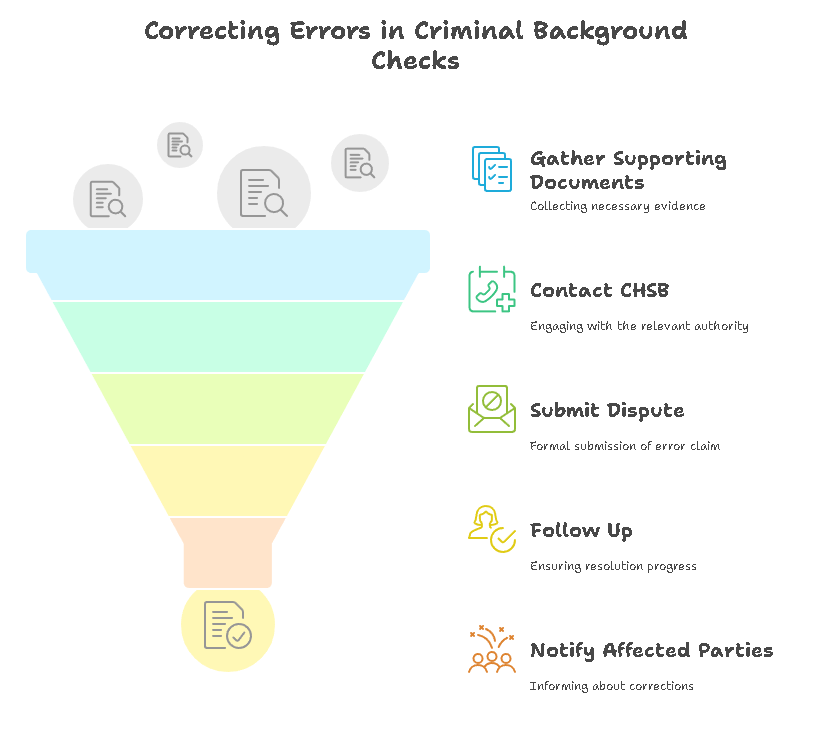
Mistakes and discrepancies can occur on criminal background checks, and it is crucial to address them quickly to avoid the negative consequences they may cause. Errors may include incorrect criminal history, outdated records, or mistaken identity issues. If you find an error on your Massachusetts criminal background check, there are specific steps to correct it.
Here’s a detailed guide on how to correct errors in a criminal background check in Massachusetts:
- Identify the Error: The first step is to carefully review your criminal background check and identify any discrepancies or inaccuracies. Common errors include:
- Mistaken identity: This occurs when your records are mixed up with someone else’s due to similar names or birthdates.
- Outdated information: Sometimes, criminal records are not updated properly, and charges that have been dismissed or sealed may still appear on the report.
- Incorrect personal information: Typos or incorrect information, such as a misspelled name or incorrect birthdate, may appear on your record.
- Obtain Supporting Documents: Once the error has been identified, you will need to gather documentation that supports your claim. This could include:
- Court records: If the error involves a conviction or charge that was dismissed or expunged, you should provide the relevant court documents that reflect this.
- Identification documents: If the error involves mistaken identity or incorrect personal information, provide documents like your driver’s license, social security card, or birth certificate.
- Contact the Massachusetts Criminal History Systems Board (CHSB): To correct the error, you will need to contact the CHSB or the relevant agency responsible for maintaining the CORI system. The CHSB offers a dispute process for individuals to address errors on their background checks. You will need to submit the required forms and provide any supporting documentation to resolve the issue.
- Submit a Formal Dispute: If the error is related to a criminal record or a case that was resolved in your favor, you can submit a formal dispute with the CHSB. Be sure to include all relevant documents to support your case, such as court orders, expungement certificates, or proof of dismissal. The CHSB will review your dispute and update the record accordingly if the error is verified.
- Follow Up: After submitting the dispute, follow up with the CHSB to ensure that the issue is resolved in a timely manner. While many disputes are resolved within a few weeks, some may take longer, depending on the complexity of the case. It is important to stay proactive and check back periodically to ensure that the issue is addressed.
- Notify Employers or Landlords: If the error on your criminal background check was the basis for a job denial or housing rejection, notify the employer or landlord of the correction once the issue has been resolved. Providing updated documentation or a corrected background check may help reverse the initial decision.
Legal Rights Under Massachusetts Law and Federal Law (FCRA)
Individuals in Massachusetts are protected by various legal frameworks when it comes to criminal background checks. Both Massachusetts law and federal regulations, such as the Fair Credit Reporting Act (FCRA), provide certain rights to individuals regarding the accuracy of their background check information.
- CORI Law in Massachusetts: Under Massachusetts CORI law, individuals have the right to access their own criminal records and dispute any inaccurate information. The law mandates that criminal records be updated regularly and that information deemed “sealed” or “expunged” should not appear on the background check unless it is required for specific purposes, such as law enforcement investigations.
- Fair Credit Reporting Act (FCRA): The FCRA is a federal law that governs how background check information can be used and shared. Under the FCRA, individuals have the right to dispute errors on their background checks, and reporting agencies are required to investigate and correct any inaccuracies. If an error on a criminal background check negatively impacts employment or housing decisions, the FCRA mandates that the employer or landlord notify the individual, who can then dispute the findings.
- Ban the Box and Other Legal Protections: Massachusetts also has laws like the “Ban the Box” initiative, which prevents employers from asking about criminal history on job applications until later in the hiring process. This law helps ensure that applicants with criminal records are not automatically discriminated against based on their past.
Precisehire’s Role in Assisting with Criminal Background Checks
Precisehire plays a pivotal role in assisting both employers and individuals navigate the complex criminal background check process in Massachusetts. As a trusted provider of background screening services, Precisehire ensures that all checks are thorough, accurate, and up-to-date. Here’s how Precisehire can help:
- Accurate and Timely Reports: Precisehire helps organizations and individuals obtain accurate criminal background checks from reliable sources. This helps avoid errors that could lead to wrong decisions in hiring or housing.
- Discrepancy Resolution: If any discrepancies are found in background check reports, Precisehire offers assistance in resolving the issue, from identifying errors to submitting the necessary paperwork for correction.
- Comprehensive Services: Precisehire provides full-service background screening, including criminal checks, employment verification, and drug testing, making it a one-stop shop for employers and individuals in Massachusetts.
Preventing Errors in Criminal Background Checks
To ensure that errors are minimized in future background checks, consider the following tips:
- Regularly Monitor Your Criminal History: Periodically check your own CORI report to stay on top of any changes or discrepancies. This helps you spot and address issues before they impact your personal or professional life.
- Clear Up Old or Outdated Information: If you have criminal records that have been sealed, expunged, or dismissed, make sure they are properly reflected in your CORI report. Keeping your record updated ensures that old mistakes do not affect your current opportunities.
- Use Trusted Background Screening Services: When going through the background check process, consider using reliable services like Precisehire to ensure that the report you receive is complete, accurate, and in compliance with legal requirements.
Data Table: Types of Criminal Background Checks in Massachusetts
| Type of Background Check | Scope and Purpose | Required for | Example Use Cases |
|---|---|---|---|
| State-Level Criminal Check | Includes criminal history within Massachusetts, from CORI. | Employers, Landlords, Schools | Employment in healthcare, public service positions |
| Federal Criminal Check | Includes criminal history from federal agencies (FBI). | Employers with national or interstate needs | Jobs involving federal contracts, government positions |
| Local Criminal Check | Includes criminal history from local law enforcement agencies | Employers, Local Government, Housing | Employment in small businesses, local organizations |
By utilizing Precisehire’s services, individuals and organizations can navigate the complexities of criminal background checks more efficiently and with confidence. Precisehire helps streamline the process, ensuring that all necessary steps are followed and that the information provided is both accurate and up to date.
Legal Aspects of Criminal Background Checks in Massachusetts
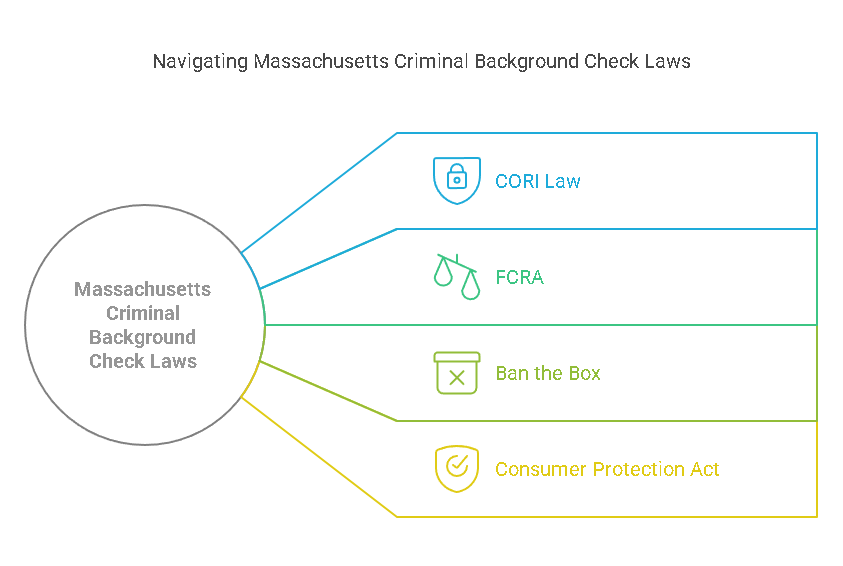
In Massachusetts, criminal background checks are governed by several laws and regulations designed to ensure fairness, transparency, and privacy for individuals. Understanding these laws is essential for both individuals undergoing background checks and employers or landlords utilizing them for screening purposes.
- The Massachusetts CORI Law: The Massachusetts Criminal Offender Record Information (CORI) Law is the foundation for criminal background checks in the state. Under this law, criminal records are maintained by the Massachusetts Criminal History Systems Board (CHSB), and individuals have the right to access their own records. However, CORI law also limits who can access these records and under what circumstances.
- Sealed and Expunged Records: In Massachusetts, certain criminal records can be sealed or expunged. Sealing a record means it is not publicly available, but may still be accessible for specific purposes, such as law enforcement or regulatory investigations. Expunging a record, on the other hand, removes it entirely from public databases. A sealed or expunged record cannot be used against you in most circumstances, including employment and housing applications.
- Accessing CORI Records: Only authorized entities, such as employers for specific job roles (e.g., working with vulnerable populations), landlords, or government agencies, can request a person’s criminal history. The individual must give written consent for these checks.
- Fair Credit Reporting Act (FCRA): The Fair Credit Reporting Act (FCRA) is a federal law that governs how background checks are conducted. Under the FCRA, individuals are entitled to:
- Know What Is in Their Background Report: Individuals must be informed if an employer or another entity uses a criminal background check in making decisions.
- Dispute Inaccuracies: If a background check contains incorrect information, individuals can dispute it, and the reporting agency must investigate the issue. The FCRA requires that disputes be resolved within a reasonable timeframe, generally within 30 days.
- Adverse Action: If an employer or landlord takes adverse action (e.g., denying employment or housing) based on the criminal history report, they are required to provide the individual with a copy of the report and a notice of their rights.
- Ban the Box: Massachusetts has adopted the “Ban the Box” initiative, which restricts employers from asking about criminal history on job applications. Employers can only inquire about an applicant’s criminal background after an initial interview or a conditional offer of employment. This is designed to give individuals with criminal records a fair opportunity to demonstrate their qualifications without immediate discrimination based on their past.
- Exemptions: Certain job positions, such as those requiring interaction with children, the elderly, or vulnerable populations, may still require a criminal background check at the application stage.
- Timing of Background Checks: Employers in Massachusetts can perform background checks at a later stage in the hiring process, ensuring that candidates with criminal records are not unfairly excluded early on.
- Massachusetts Consumer Protection Act: This law protects consumers from unfair or deceptive practices, including misuse of criminal background information. For example, if an employer uses outdated or incorrect information to make hiring decisions, it may violate consumer protection laws.
Frequently Asked Questions (FAQs)
How Long Does It Take to Get a Criminal Background Check in Massachusetts?
In most cases, criminal background checks in Massachusetts can be processed within a few days to a few weeks, depending on whether the request is made online or by mail. If there are complications, such as discrepancies or the need for further verification, it may take longer.
Can I Get a Criminal Background Check if I’ve Been Convicted of a Crime in Another State?
Yes, if you have been convicted of a crime in another state, it will likely appear on your federal criminal background check. However, state-specific criminal checks only reveal information related to offenses within Massachusetts.
Can an Employer Reject Me Based on a Criminal Record in Massachusetts?
Massachusetts employers are prohibited from using criminal records as an automatic disqualifier. However, certain convictions may prevent you from being hired for specific roles, especially if the offense is relevant to the job. Employers must also consider the age of the offense and whether it is directly related to the responsibilities of the job.
How Can I Expunge or Seal My Criminal Record in Massachusetts?
Expunging or sealing a criminal record in Massachusetts can be a complex process, but it is possible. Expungement typically applies to cases where the individual was acquitted or the charges were dropped. Sealing records, on the other hand, is more common for older offenses, especially if you have demonstrated rehabilitation. The process involves filing a petition in court and meeting eligibility criteria.
What Should I Do if I Find an Error on My CORI Report in Massachusetts?
If you discover an error on your CORI report, you should first contact the Massachusetts Criminal History Systems Board (CHSB) to dispute the information. You may need to provide supporting documents to demonstrate the inaccuracy. CHSB is required to investigate and correct errors, usually within 30 days.
Conclusion
Understanding criminal background checks in Massachusetts is crucial for both individuals and organizations. The process ensures that employers, landlords, and other institutions can make informed decisions while protecting individuals’ rights to privacy and fairness. Navigating the complexities of CORI laws, FCRA regulations, and the Ban the Box initiative can be challenging, but awareness of these laws helps safeguard against discriminatory practices.
If you are facing issues with a criminal background check in Massachusetts, Precisehire can assist you throughout the process. Whether you are an employer needing to conduct thorough, accurate background checks, or an individual seeking to clear up discrepancies in your report, Precisehire offers expert services to ensure that the background check process is smooth and efficient. Precisehire helps employers comply with legal requirements while giving individuals the chance to address issues quickly, ensuring fair opportunities for all.
By staying informed, understanding your legal rights, and utilizing trusted services like Precisehire, you can avoid the pitfalls of inaccurate or outdated criminal records and ensure that background checks serve their intended purpose without causing unnecessary harm.
